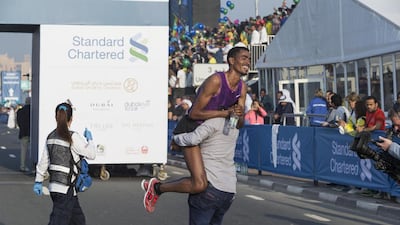East African runners have dominated long-distance running competitions for decades. There is even a cottage industry devoted to how and why East Africans are so skilled at running marathons – their success comes from a combination of altitude training, diet and developing strong feet at an early age. The meteoric rise of these runners to global dominance has earned athletic companies such as Nike and Adidas a fortune from sponsorship deals and other associations.
Why should the marathon success of Africans translate into profits for multinational companies? With emerging market capitalism redefining the growth prospects of African markets, is it not high time East African runners take advantage of their success and market their own home-grown equipment.
That is the thinking behind Kenya’s first running shoe company, and it says more about African economies than one might think. Two entrepreneurs, one Kenyan and one American, are trying to transform Kenyan dominance in running into profit with a local shoe company called Enda, the Swahili word for “go”.
Irrespective of whether the shoe succeeds, its mere existence is reflective of a larger trend across Africa, whereby the continent is investing in itself and entrepreneurship is on the rise. For the last decade, analysts have spoken of Africa rising because of the growth of emerging markets. The question is whether intra-African investment and the entrepreneurial uptick demonstrated by companies like Enda will be enough to catapult African economies to greater prosperity.
Underlying the growth on the continent is the issue of whether intra-African competition hinders the ability of African markets to compete with developed economies in the West and in Asia. Could a more mature Enda compete with Nike for a slice of the lucrative American fitness market or should it be content with a substantial share of a large African market like Nigeria?
According to the United Nations, between 2001 and 2012, foreign direct investment (FDI) in African service sectors increased four-fold thanks to an influx of investment from other African countries. The ability of African companies to operate in complex and sometimes duplicitous market environments gives them a clear advantage over multinational companies doing business in the same places.
They have experience with slow bureaucratic systems that define doing business across the continent. And, in difficult market conditions, supply-chain management experience counts for more than multinational brand appeal.
The rise of competition as evidenced by intra-African FDI presents several opportunities for the continent’s emerging markets. Doing business in less developed markets will result in the creation of infrastructure, increased competition, enhanced brand value, and more innovative strategies that do not necessarily exist in more developed markets.
Such strategies do not have to come at the expense of opportunities in developed markets, but the inward focus demonstrates a shift in growth opportunities.
The largest recipients of intra-African FDI projects over the past decade include several unlikely countries: Ghana, Kenya, Zambia, Rwanda, and Uganda. These countries received more than 45 per cent of total intra-African investment between 2003 and 2013.
The data suggests a race between African firms to tap fresh markets on the continent. And it is not just in manufacturing or services, the banking sector is ripe with intra-African competition and investment.
Morocco’s banking industry, for example, is considered one of the largest and most developed in Africa. Instead of relying on their links to French banks to expand into lucrative European markets, Moroccan banks are extending their reach into Sub-Saharan Africa, with the aim of increasing their SME loan footprint and funding business growth. More than 17 per cent of their foreign activity is in Africa, and Moroccan banks are present in 22 African countries. These numbers are growing.
With the rise in intra-African FDI and increased competition among African countries in the services, banking and manufacturing sector, it was only a matter of time before a company like Enda came onto the scene.
Now that oil prices are stabilising, Africa’s key emerging markets must get back to building their manufacturing and services sectors. If they succeed, Africa will be on the track to rise out of itself.
jdana@thenational.ae
On Twitter: @ibnezra

